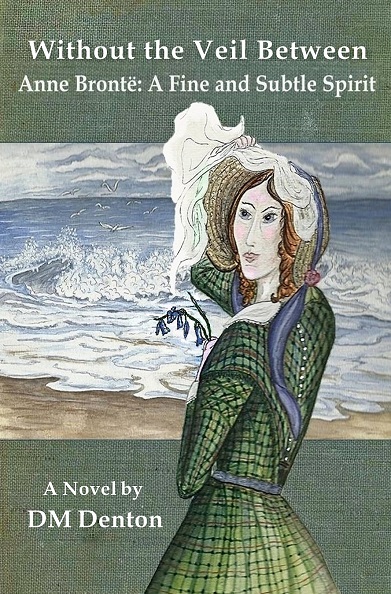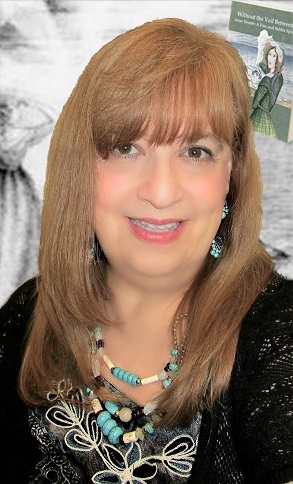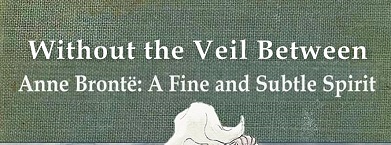Earlier in the week I marked World Sight Day by looking at Patrick Brontë’s sight saving operation, and the impact it had on the Brontës, but today’s post is something different – an interview with DM Denton, the American author of acclaimed novel ‘Without The Veil Between, Anne Brontë: A Fine And Subtle Spirit’.
There have been several attempts down the years to portray members of the Brontë family in a fictional form, and it can be a dangerous undertaking as I feel you really have to have a love of the family to be able to pull it off. Thankfully, Diane Denton certainly has that, and it’s a quality that was also evident in another excellent recent piece of Brontë related fiction, SR Whitehead’s ‘The Last Brontë’.

Diane is obviously very familiar with Anne’s novels and poems, and as she lived in the UK for sixteen years she understands the landscape the Brontë siblings looked upon as well. Here, then, are DM Denton’s answers to the questions I set her:
“Diane, you’ve become noted for your historical fiction, but what made you pick Anne Brontë for a subject?
First, let me thank you, Nick, for having me as a guest on your blog. My interest in the Brontës began in my youth, through my mother’s prized 1943 Fritz Eichenberg illustrated editions of Wuthering Heights and Jane Eyre. Emily dominated my Brontë consciousness for a long time, while I enjoyed Charlotte’s writing but wasn’t so impassioned about her. Anne tugged patiently at my awareness and curiosity, until, over decades, the combination of visiting Scarborough and standing in front of her grave in St. Mary’s churchyard, coming upon a miniature edition of Agnes Grey my mother had bought in Oxford that serendipitously opened to Chapter XXIV, The Sands, and having the idea for a series of novellas about undervalued women authors, set me to write about Anne. Sometimes the closest thing to ourselves takes a long time to reach. A friend of mine insisted it should be a full length novel. I resisted the suggestion, mainly because I didn’t think there was enough material, but my research and writing of a few chapters convinced me she was absolutely right. All those “little things” about Anne’s character, life and writing too often ignored, rushed over, or put in the context of her sisters and brother, offered more than enough.
The book’s title is ‘Without the Veil Between, Anne Brontë: A Fine and Subtle Spirit’. What was the inspiration for the title?
Without the Veil Between is the last line from Anne’s poem In Memory of a Happy Day in February (1842), referring to the veil between her and God, earthly and eternal life. In choosing that phrase as the title, I realized, as well as representing Anne’s piety, it could symbolize the veil that had obscured Anne from consideration and appreciation, one I wanted to respectfully lift. When the poem was published posthumously in 1850, Charlotte made some edits to it, including the second to last line that leads up to without the veil between, changing To see the glories of his face to Like Moses, I would see His face. At the end of the novel, I chose to use Anne’s version, because I felt it was her way of implying it wasn’t just God she was looking forward to being reunited with after death.
As I neared the novel’s completion, I needed a subtitle that would identify it as being about Anne. The first line from her poem The Bluebell, suggested by the same friend who insisted the book be a novel, offered the perfect solution.
The book features your own illustrations. Did Anne Brontë’s drawing skills inspire you, as well as her writing skills?
Certainly. All the Brontë siblings were very artistic, their artwork giving an intimate view into their lives. I have always loved the way 19th century novels were illustrated. I had already done cover artwork for my own and others’ publications and interior illustrations for another author. When I asked my publisher if I could add some, she said: “I was hoping you would want to!”

Your book looks at Anne Brontë’s time at Thorp Green Hall and at her relationship with William Weightman. Do you think she loved Weightman and did he love her?
I do think love was budding between them, probably, at that early stage, more seriously for Anne. Although William did enjoy being a flirt, he might have soon realized, because of Anne’s patience and faith and his own maturing, what a loving, constant companion and excellent curate’s wife she would have made him. As I wrote her reaction to the news of William’s death, I certainly experienced the romantic tragedy that had been inflicted upon her, but, also, how her resolve to do something positive and purposeful with her life was strengthened. I think the happier ending she gave Agnes Grey reflected, not only what she had hoped for, but, also, how she might find a satisfying and productive way to go on in the Mr. Weston-less version of her real-life story.
What is your favourite Anne Brontë poem and why?
The Bluebell, as it is beautifully written, features one of my favourite flowers that evokes special memories from my own life and symbolizes Anne herself. A bluebell seems insignificant and vulnerable, even a little sad, until one realizes its lovely pervasive colour and fragrance, and buoyancy that gives it the ability to bend without breaking. Its silent eloquence appealed to Anne, how it ‘understood’ it had more or less of power. I also love the way the poem looks backwards and forwards, acknowledging, as Anne often does, how bliss and melancholy, hope and disappointment are often part of the same experience or reflection. Not least, I love this poem because it introduces others to my labour of love about her!
What message does Anne have for people today?
I think Anne’s own words can answer that better than any I might come up with. There are so many I could quote that are still relevant. As a life lesson, a wise and compassionate alternative to the self-interest and fear-mongering we see infecting society today, I often go back to this one: But no generous mind delights to oppress the weak, but rather to cherish and protect.
Another quote, from Anne’s preface to The Tenant of Wildfell Hall, speaks to the present in terms of how important honesty, integrity, courage, and activism is: I wished to tell the truth, for truth always conveys its own moral to those who are able to receive it. But as the priceless treasure too frequently hides at the bottom of a well, it needs some courage to dive for it, especially as he that does so will be likely to incur more scorn and obloquy for the mud and water into which he has ventured to plunge, than thanks for the jewel he procures …
Your book has, quite rightly, had some great reviews – do you think you’ll return to the Brontë family for future books?
I haven’t any plans to at this time, but one never knows. Of course, I hope my book about Anne will be read by more and more for a long time, for, in terms of my life and writing style and standards, I never want to move too far away from her.
What do you think Anne and her sisters would have thought of the worldwide fame they’ve achieved two hundred years after their births?
Just going by her reaction to celebrity in her lifetime, I think Charlotte would have loved and hated it, the former when she felt she could control it and the latter when she couldn’t. It’s tempting to assume Emily would have scoffed at it, tried to avoid it and her life being changed by it, and even been very distressed by it. But there might have been a glimmer of satisfaction in it for her. I’m not sure any of them would have been comfortable with fame for themselves, other than its effect of offering them a living through writing. Certainly Anne would have seen the chance to be more charitable. I do believe she would have been pleased her voice, her message was finally being heard, while remaining vigilant to it being misconstrued. She would have realized the providence and explored the potential of the platform fame had given her.
What are you working on at the moment?
I’m about 10K into another biographical novel, this one about Christina Rossetti (1830 – 1894), Victorian poetess and the youngest sister of Pre-Raphaelite Brotherhood founder, artist and poet, Dante Gabriel Rossetti. The Rossetti siblings (including another brother William and sister Maria) were like the Brontës in terms of their personal and creative closeness, their loyalty to and support of each other holding up through thick and thin. The novel is just beginning to take shape in terms of its form, covering Christina’s life from childhood to, at least, middle-age, if not beyond.”
*****
Thanks to Diane for some very illuminating answers there. The book can be purchased from Amazon in the UK here and in America here, and you can find out more about DM Denton and her historical novels at her website here.

Thank you so much, Nick, for hosting me on your blog and for offering such excellent questions that were a pleasure to answer – as “talking” about Anne always is!
Really enjoyed reading this interview … and highly recommend Without the Veil Between.
Lovely interview, it offered some insights into Diane’s thinking and Bronte’s life that were new and refreshing. Thanks!